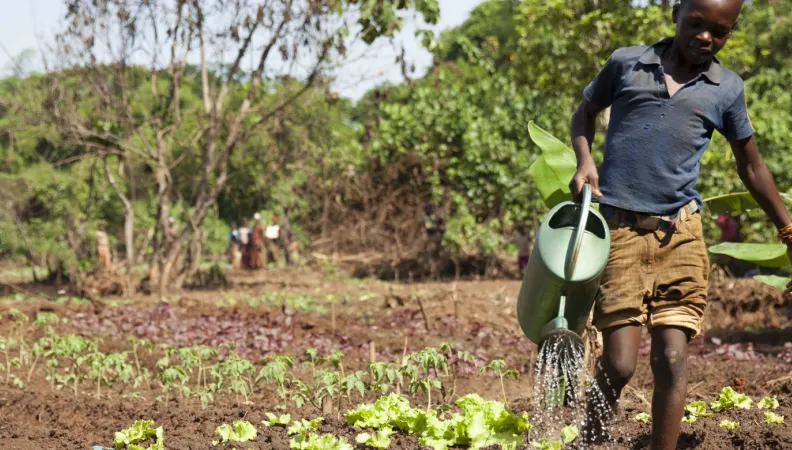Share the page
Improved Food Security will require More Inter-African Trade
Published on

Why is food insecurity again on the rise in Africa? Bio Goura Soulé, co-author of the African Economies in 2023 report, lays out the reasons in detail. The professor and researcher specializing in livestock and pastoralism has studied food and hunger across the continent. As we mark one year since the Russian invasion of Ukraine has decimated food exports to developing countries worldwide, Soulé cites a surprising statistic, and identifies some home-grown solutions.
What is the food security situation in Africa today?
Bio Goura Soulé: Africa still suffers significant food security problems, namely undernourishment and malnutrition, though there are disparities from one region to another. Undernourishment impacted 278 million Africans in 2021, representing a third of those affected worldwide. Some aspects are improving, as we can see by malnutrition among children under age 5 having decreased by 10% in the last ten years. But, overall, Africa still suffers higher malnutrition rates than the rest of the world, and new phenomena are emerging. Obesity rates are increasing among adults with higher purchasing power, for example.
See also: “The Goal of Zero Hunger by 2030 will be Hard to Achieve”
What are the root causes of this food insecurity?
The number one cause is low purchasing power. More than 40% of Africa’s population lives on less than $1.90 a day, making it difficult for them to access food easily. In my opinion, this is the main cause, far ahead of product availability, given that on average only 16% of food comes from the international market.
The second cause is the high cost of products and inputs, which are subject to high price volatility in the markets. Africa is one of the continents most exposed to external shocks, such as the Russia-Ukraine war, which is raising prices because of its strong repercussions on hydrocarbons, input prices, supply chains, and others.
And there are other aggravating factors. One is climate change, which affects production, especially in West and East Africa. Then there are conflicts, which lead to population displacements and disruptions in production and distribution. We can also mention impact from the Covid pandemic and the effects of the demographic boom.
See also: African Economies: the Outlook for 2023
What can be done to solve this insecurity?
Many policies and methods have been adopted, but agricultural policies are often very compartmentalized. Because they aren’t linked to other sectors of the economy, their effectiveness is currently very limited. This is the case of the agricultural policy promoted as part of the Comprehensive Africa Agriculture Development Programme (CAADP), which was supposed to improve product availability and promote trade between African countries. Unfortunately, many tariff barriers and other factors impede the growth of these trade flows.
What’s most important in fighting food insecurity is for States to commit to making it a vital issue, by addressing the root cause of the problem. The solutions must be seen in terms of food sovereignty, which means even less dependence on imports [from outside the continent], with agricultural and trade policies more favorable to farmers.
Exchanges between African countries must be encouraged according to the comparative advantages of each country. Similarly, it’s important to support agri-food systems that make the best use of production and processing potential and which promote healthy consumption habits.
A holistic approach to promoting local food systems is needed. This is how countries will be able to improve productivity, increase their population’s incomes, and give people the means to access food suitably.
See also: AFD Intervenes to Tackle the Food Crisis
How can production be increased without harming the environment?
Experts from CIRAD (the French agricultural research and international cooperation organization) estimate that by 2050 Africa will need an extra 500 million hectares to meet its food needs, which will have grown 160%. Demand will be met even if nothing is done, but not without environmental destruction including deforestation.
Africa must achieve its agroecological transition and promote more virtuous production practices. These already exist, but they depend on environmentally harmful production methods that use tractors, herbicides, and pesticides. The transition is possible but requires significant government investment to support agroecology-based production.
Attend the “Africa Feeds Africans” conference on February 27 at the International Agricultural Show, in Paris – a conference organized by CIRAD, ECOWAS and Roppa - the Network of Farmers Organizations and Agricultural Producers of West Africa
